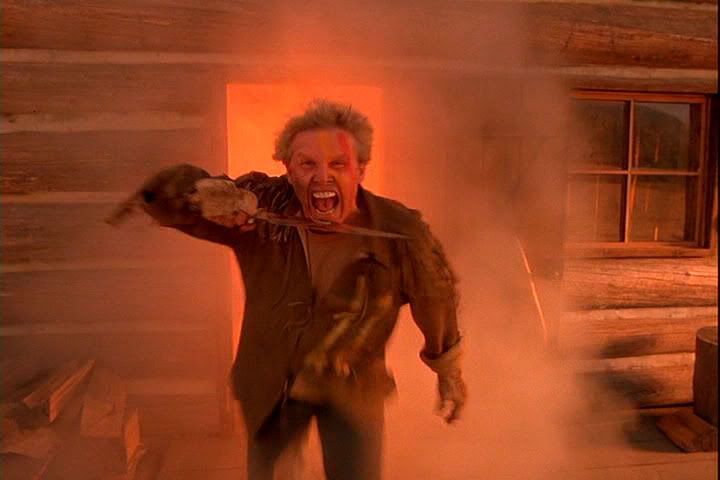High Theory: Accessible at Last!
The prose style of what is known as literary theory -- a hodgepodge of German metaphysics and French gibberish spun out by a loose coterie of gay continental philosophers, post-gendered beard-strokers, half-mad babblers, and the odd full-on hypocrite -- is about as preposterous as a three-legged triceratops gouging with its horns at a whirlwind of duck feathers. (Witness, for instance, Judith Butler's infamous Bad Writing Contest-winning sentence for 1998.)
This style is adopted, argues evolutionist-cum-jester and disliker of theory Richard Dawkins, by "intellectual impostor[s] with nothing to say, but with strong ambitions to succeed in academic life." In a legendary depantsing of theory, reformed hoaxers Alan Sokal and Jean Bricmont declare that a work of uncut Theory-with-a-capital-T is lucky to squeak out "a handful of intelligible sentences -- sometimes banal, sometimes erroneous" -- like so many pearls cast before, gobbled up, and shit out by swine. Semifamous (serious) philosopher Thomas Nagel isn't sure which piston drives theory's engine more forcefully: "invincible stupidity," or "the desire to cow the audience with fraudulent displays of theoretical sophistication." In fact, no one seems to be sure whether theory is the work of a dangerous cabal hellbent on undermining the very fabric of intellectual discourse, or a b-squad of Mr. Beans whose ineptitude would almost be charming only they could stop drooling all over their MedicAlert bracelets that warn of allergies to peanuts and lawn-grass.
Indeed, the rage for order shared by these unmaskers -- this desire for words to make sense -- wouldn't be nearly as interesting if the venom wasn't in part meant to conceal the deep anxiety that perhaps there exists an almost-unimaginable third way, somewhere between diabolical evil and developmental disability -- what if this theory stuff isn't total horseshit? What if it's brilliant and I just don't get it?! When it's invoked, this anxiety is brushed aside with a mirthful chortle, as if these hatchetmen were conceding, as an afterthought, "Of course, everybody knows it's true that OJ Simpson is technically innocent, according to the Constitution -- but come on."
Noam Chomsky, who has had Serious Documentaries made about him and is referenced in Good Will Hunting, and whose intellectual credentials are therefore unimpeachable, has offered the most concise example of the confused combination of rage and insecurity, condescension and defensiveness that characterizes any really rollicking anti-theory screed: "No one who says they do understand can explain it to me and I haven't a clue as to how to proceed to overcome my failures. That leaves one of two possibilities: (a) some new advance in intellectual life has been made, perhaps some sudden genetic mutation, which has created a form of 'theory' that is beyond quantum theory, topology, etc., in depth and profundity; or (b) ... I won't spell it out." It's a dazzling rhetorical strategy -- Chomsky plays the wide-eyed naif who is loathe to think an entire international industry of professional writers, thinkers, teachers, and students is... well... it's too horrible even to say!
But if he is capable of scoring from the goalie box, he is also adept at playing offense-as-defense, crossing and striking so as not to be struck. Of seminal theory bigwig Jacques Derrida, Chomsky says, "I found the scholarship appalling, based on pathetic misreading; and the argument, such as it was, failed to come close to the kinds of standards I’ve been familiar with since virtually childhood. Well, maybe I missed something: could be, but suspicions remain." You see? Even as a baby -- or close enough -- Chomsky would have been hip to the con. Derrida's work is appalling. Pathetic. A failure. Unless it's actually really good. Doubt it though.
This dexterous double-doubt -- "is it good or does it suck, and either way, why am I so mad about it?" -- wobbles on the crux of that age-old problem, the problem which is very nearly theory's only subject of concern: Is the meaning of a given statement comprehensible in all its facets and tints, or does some of its significance evade ready comprehension? Put another way, "Does this here word-caterpillar mean something smarter than what it looks like?"
Well, in a half-assed attempt to clear up this confusion, to tear down the language barrier between self-evident Dawkinsian or readily-intelligible Chomskese and the Nonglish of English departments worldwide, I have gone beyond the pale and violated the unspoken pact that binds all of us who make our living, no matter how obliquely, through the incantations and ululations of the unkempt and savage hobo-philosophy known as high theory. I have taken it upon myself to Benedict Arnold the whole theory enterprise by translating select paragraphs by certain theoretical luminaries -- without losing an iota of intended meaning (jk lol) -- into voices that might be less alien to those casual readers repelled by theory's uncircumcised pomp and smooth-shaven circumstance. In so doing I hope to allow self-loathing positivists, pragmatists in the throes of a dark night of the soul, and scientists on their brain-period to accept the brilliance, profundity, and salubrious revolutionary power of theory, as God intended, or to reject it wholesale once and for all, without the self-conscious pussyfooting of men wearing skirts for the first time publicly.
On with the show. First, the abstruse theoreticians in their own words. Next, their words banged and yanked into the everyday speech of unicorns and pegasusi.
- Theodor Adorno, sourpuss: "Cultivated philistines are in the habit of requiring that a work of art 'give' them something. They no longer take umbrage that works are radical, but fall back on the shamelessly modest assertion that they do not understand. This eliminates even opposition, their last negative relationship to truth, and the offending object is smilingly catalogued among its kind, consumer commodities that can be chosen or refused without even having to take responsibility for doing so."
- Theodor Adorno, as translated into an embittered-but-lazy art school traditionalist: "Posers who say they care about art but really don't care about art, man, all they want to do is take, they don't want to give anything back. But they're too stupid, or too scared to be wrong, even to be mad that this gallery is showing poop sculptures and blood paintings. They just stand there looking at some installation, like some mobile made out of used tampons glued to turtle bones, and they're all, 'I don't get it.' They don't even call bullshit. They're just like 'well, that's not really my thing.' That's bullshit, man. They don't even take a stand for anything. That's why the art is dying."
- Giorgio Agamben, crypto-fascist: "Being in force without significance:...What, after all, is the structure of the sovereign ban if not that of a law that is in force but does not signify? Everywhere on earth men live today in the ban of a law and a tradition that are maintained solely as the 'zero point' of their own content, and that include men within them in the form of a pure relation of abandonment. All societies and all cultures today (it does not matter whether they are democratic or totalitarian, conservative or progressive) have entered into a legitmation crisis in which law (we mean by this the entire text of tradition in its regulative form, whether the Jewish Torah or the Islamic Shariah, Christiam dogma or the profane nomos) is in force as the pure 'Nothing of Revelation.' But this is precisely the structure of the sovereign relation, and the nihilism in which we are living is, from this perspective, nothing but the coming to light of this relation as such" (Homo Sacer, 51).
- Giorgio Agamben, as translated into a caricature of an Appalachian wingnut: "The gubmint just do what it want for no good reason. The gubmint always hangin' 'round behind you, but you can't see it, you don't know when it be making you do something and you don't even know it's making you do it. Everybody in the world being run by gubmints, and gubmints don't care none 'bout people -- just suck us dry. Everywhere in the world, Muslims and liberals and fascists and pinkos, all the same. They take away your freedoms. Gubmint's the enemy of the common man. It don't care none. Never did."
- Walter Benjamin, tragic tramp: "What does language communicate? It communicates the mental being corresponding to it. It is fundamental that this mental being communicates itself in language and not through language. Languages, therefore, have no speaker, if this means someone who communicates through these languages. Mental being communicates itself in, not through a language, which means that it is not outwardly identical with linguistic being. Mental being is identical with linguistic being only insofar as it is capable of communication. What is communicable in a mental entity is its linguistic entity. Language therefore communicates the particular linguistic being of things, but their mental being only insofar as this is directly included in their linguistic being, insofar as it is capable of being communicated."
- Walter Benjamin, as translated into a stoned dude who just put down an acoustic guitar at 3 in the morning: "It's like, we think we say stuff with language. But what does language say? What if what language says is itself. Like, do you ever feel like when you say something, it's not like you're talking with language, it's like language is talking with you? Like, what if language is like, this body, and we're all just like little cells in it. No, think about it -- like, sperm is part of us, but at the same time sperm are these little animals in our bodies. What if we're just language's sperm? So like, what we think we mean isn't really what we mean, because like we're just on a mission for language, and we can't see the bigger picture. So like, when we say stuff, we mean what we think we mean, but we also mean, like, way more. Because, like, language means all this other stuff, too."
- Paul de Man, Nazi-sympathizer who Jews sympathized with, fan of irony: "In the study of literature, the question of the self appears in a bewildering network of often contradictory relationships among a plurality of subjects. It appears first of all, as in the Third Critique of Kant, in the act of judgment that takes place in the mind of the reader; it appears next in the apparently intersubjective relationships that are established between the author and the reader; it governs the intentional relationship that exists, within the work, between the constitutive subject and the constituted language; it can be sought, finally, in the relationship that the subject establishes, through the mediation of the work, with itself. From the start, we have at least four possible and distinct types of self: the self that judges, the self that reads, the self that writes, and the self that reads itself. The question of finding the common level on which all these selves meet and thus of establishing the unity of a literary consciousness stands at the beginning of the main methodological difficulties that plague literary studies."
- Paul de Man, as translated into a middle school English teacher so careful to be precise that she almost becomes confusing: "In this class we're all going to put on different hats and go to a lot of faraway lands without leaving our seats! You're all going to have opinions about what you read. But what's funny about reading is, someone else's words are in your head! Think about that -- you're thinking in your head, but you're thinking somebody else's thoughts! That'll tickle your noodle! So we're all going to have to try to figure out what the author was trying to say in his book, and what it means to us. But also, it's important to think of what it the writer thought his book meant. So we're going to have to put on four hats in all. We're going to be reading, and thinking about what we read, and writing about what we think, and even thinking about what we think! Did that blow your mind? Believe you me, it's not easy to wear those hats all at the same time! Have you ever put on four hats and looked at yourself in the mirror? It might be a fashion no-no, but it's an English yes-yes!"
- Jacques Derrida, grand wizard of nonsensical sense: "The two concepts (friend/enemy) consequently intersect and ceaselessly change places. They intertwine, as though they loved each other, all along a spiralled hyperbole: the declared enemy (Blake declares the enemy by ordering him to declare himself: be my enemy), the true enemy, is a better friend than the friend. For the enemy can hate or wage war on me in the name of friendship, for Friendships sake, out of friendship for friendship; if in sum he respects the true name of friendship, he will respect my own name. He will hear what my name should, even if it does not, properly name: the irreplaceable singularity which bears it, and to which the enemy then bears himself and refers. If he hears my order, if he addresses me, me myself, he respects me, at hate's distance, me beyond me, beyond my own consciousness. And if he desires my death, at least he desires it, perhaps, him mine, singularly. The declared friend would not accomplish as much in simply declaring himself a friend while missing out on the name: that which imparts the name both to friendship and to singularity. That which deserves the name."
- Jacques Derrida, as translated into a teenage girl who wants you to think she's more distraught, and more thoughtful, than she really is: "Omigod, sometimes I hate my friends so much. I know it sounds totally stupid but I feel like my enemies are the only people I can trust. It's like, I trust my friends one minute but then they stab me in the back. Ashley is totally acting like we're total BFFs, but ten seconds later she went through my bag while I wasn't looking and she's using my lipgloss again without asking, which is just super disrespectful. It's my property and she doesn't even have the common courtesy to ask if it's ok, and I've already told her not to do it a bajillion times. She totally would ask if we weren't such good friends, so it's like, what good are friends anyway? But like, when Blake told me I was his worst enemy when we were playing badminton in gym, I totally trusted him. I know it sounds retarded or whatever, but it's true. It's like, at least I know where I stand with Blake. I feel like Ashley just hangs out with me because people think she's cool, she does it just to be seen with me, so she doesn't look like such a spazz like she did when she was all fat and had acne last year before I showed her how to put on foundation and not eat three Fruit by the Foots every day at lunch. But Blake like totally hates me and he doesn't even care how it makes him look. It's so honest that sometimes I almost feel like he's, like, in love with me. He doesn't go rooting through my bag and taking my stuff and pretending he didn't think I would be mad. Even if he did, at least he'd just be doing it to piss me off. He'd be thinking of me and not just how everybody thinks he's totally popular because I let him smoke with me in my car during open period. God, Ashley is such a bitch!"

.jpg)












